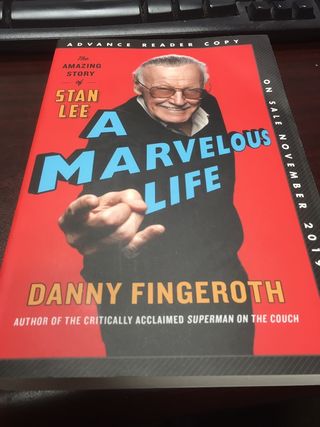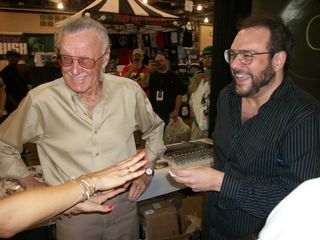Neuroticism
Stan Lee Bio: Who Wrote the Most Neurotic Superheroes?
Danny Fingeroth's bio looks at how Stan Lee added psychological depth to comics.
Posted September 25, 2019
Together with innovative artists such as Steve Ditko and especially Jack Kirby, Stan Lee built the Marvel Universe upon the foundations Kirby had laid together with Joe Simon, Carl Burgos, Bill Everett, and many other creators. In 1961, weary of continuing to tell the same kinds of stories he'd been writing since he was a teen during the era of World War II, Lee was ready to quit the business. At his wife Joan's suggestion, though, he gambled on producing a story with characters he'd like to read by adding psychological depth to the heroes and he Kirby introduced in Fantastic Four #1. These heroes in the Fantastic Four had problems. They squabbled. They suffered. They could be unhappy and even unpleasant people. They grew and changed. Fantastic Four became the flagship title from which a new universe of complex heroes would explode at a time when superhero comics elsewhere had grown flat. The Avengers, X-Men, Spider-Man, Daredevil and more soon arrived to join Marvel's first family of troubled figures. As author Danny Fingeroth notes in A Marvelous Life: The Amazing Story of Stan Lee, his biography of the man born Stanley Martin Lieber, superheroes turned neurotic.

During the months and years to come, many biographies of Stan will emerge, ranging from flattery to condemnation, and the truth surely lies somewhere in between. Danny Fingeroth, who knew Stan "the Man" well, started working on this biography long before the esteemed Mister Lee left our world for his next adventure. Drawing information from Lee's own archives, firsthand experience, others who knew the most famous comic book creator who ever lived, and many more sources, Fingeroth strives to be both factual and fair to all parties concerned throughout this complicated and controversial life history. This gripping and entertaining read offers an account not only of one man but also of Marvel Comics itself, along with the lives impacted along the way.
In his afterword, Danny Fingeroth says of Lee's co-creations, "Convenient shorthand could be to call them—as many reporters have—neurotic, suffering from neurosis," referring to personality issues typified by anxiety, indecision, and maladjustment. In 1963's The Amazing Spider-Man #4, a man on the street says that Spider-Man "must be a neurotic of some sort!" and the word keeps turning up again. Fingeroth once quipped that we should do a convention panel together, "Who's the Most Neurotic Superhero?" I liked the idea, and so what had been kind of a joke became real. We presented versions of that topic at least seven times led by Danny and joined by a variety of our fellow psychologists and industry pros, usually at Wizard World conventions. Even though neurosis is not a modern diagnostic term in the DSM, these discussions allowed us to examine a number of very real psychological issues as filtered through the lens of comic book superheroes, the majority of whom Stan Lee co-created or at least wrote at one time or another. Captain America, for example, was not at all his creation, but Lee added guilt, angst, and other complexities by killing off Cap's underaged partner Bucky and making this hero a man out of his time. In the end, no matter who joined us for these discussions, it was hard to avoid bestowing the Most Neurotic Superhero award upon Spider-Man time and time again. While much of that comes from artist and co-creator Steve Ditko, it was Stan who put the neurotic words in the characters' mouths.
As happens with one creative individual after another, his art reflects his life. As Fingeroth also observes in his afterword, Lee drew upon his own experience with sadness, despair, and regret. "His experience with angst and sadness could have come from any number of sources...."

Getting into the psychological issues most relevant to this website seems a bit of a downer, but Stan Lee did indeed have a marvelous life and we love his characters for the humanity he and his co-creators imbued in them. Being human includes the pain and the joy.
Full disclosure: It was Danny Fingeroth's book Superman on the Couch that inspired me to write and edit the kind of books I work on. Stan Lee provided forewords for two of them (Captain vs. Iron Man: Freedom, Security, Psychology and Daredevil Psychology: The Devil You Know).
Related posts:
References
Fingeroth, D. (2004). Superman on the couch: What superheroes really tell us about ourselves and our society. New York, NY: Continuum.
Fingeroth, D. (2019). A marvelous life: The amazing story of Stan Lee. New York, NY: St. Martin's.
Langley, T., Bean, A., Langley, A., Benjamin, P., & Fingeroth, D. (2016, September). Who’s the most neurotic superhero? Inside the minds of Batman, Spider-Man, Captain America, Jessica Jones, and more. Wizard World Austin Comic Con, Austin, TX.
Langley, T., Haspiel, D., Zubernis, L., & Fingeroth, D. (2017, June). Who’s the most neurotic superhero? Inside the minds of Batman, Spider-Man, Captain America, Jessica Jones, and more. Wizard World Philadelphia Comic Con, Philadelphia, PA.
Langley, T., Haspiel, D., Wesselmann, E., & Fingeroth, D. (2017, July). Who’s the most neurotic superhero? Inside the minds of Batman, Spider-Man, Captain America, Jessica Jones, and more. Wizard World Chicago Comic Con, Rosemont, IL.
Langley, T., Langley, A., Witterstaetter, R., Dandridge, V., & Fingeroth, D. (2016, October). Who’s the most neurotic superhero? Inside the minds of Batman, Spider-Man, Captain America, Jessica Jones, and more. Wizard World Tulsa Comic Con, Tulsa, OK.
Langley, T., Sedelmaier, J. J., Langley, A., & Fingeroth, D. (2016, August). Who’s the most neurotic superhero? Inside the minds of Batman, Spider-Man, Captain America, Jessica Jones, and more. Wizard World Chicago Comic Con, Rosemont, IL.
Langley, T., Sikoryak, R., Scarlet, J., Langley, A., Kaplan, A., & Fingeroth, D. (2017, July). Who’s the most neurotic superhero? San Diego Comic-Con International, San Diego, CA.
Langley, T., Van Lente, F., Haspiel, D., Scarlet, J., & Fingeroth, D. (2017, January). Who’s the most neurotic superhero? Inside the minds of Batman, Spider-Man, Captain America, Jessica Jones, and more. Wizard World New Orleans Comic Con, New Orleans, LA.
Lee, S. (2016). Foreword: The head! The heart! The heroes! In T. Langley (Ed.), Captain America vs. Iron Man: Freedom, security, psychology . New York, NY: Sterling.
Lee, S. (2017). Foreword: The devil you know. In T. Langley (Ed.), Daredevil psychology: The devil you know. New York, NY: Sterling.


